المراقبة والتقييم
لا تتعلق معظم تحديات الرصد والتقييم، مثل الافتقار إلى الاستثمار والقدرات الكافية، تحديدًا بالمساعدات النقدية والقسائم. لكن تلك التي تتعلق في المقام الأول برصد نتائج عمليات النقل غير المقيدة. ويمكن أن تجعل مرونة التحويلات النقدية من الصعب تحديد مؤشرات النتائج المناسبة، لأنها قد تتضمن مجموعة من المؤشرات القطاعية والشاملة. وفي الوقت نفسه، هناك قيود على جمع بيانات دقيقة حول كيفية إنفاق التحويلات النقدية.
التزم الموقعون على الصفقة الكبرى بضمان وجود آليات الرصد والتقييم ذات الصلة فيما يتعلق بالنقد، وزيادة فهم التكاليف والفوائد والآثار والمخاطر المتعلقة بالنقد بالنسبة للطرائق الأخرى. بناءً على ذلك، يحتوي مسار الصفقة الكبرى على نقاط عمل بما في ذلك تطوير مؤشرات نتائج مشتركة للمساعدات النقدية متعددة الأغراض، ومقاييس لتحليل القيمة مقابل المال. تم تقييد التحليل المنهجي للقيمة مقابل المال بسبب عوامل تشمل عدم وجود نهج متفق عليها، والحاجة إلى بيانات نتائج عالية الجودة، وطبيعة التحليل.
الأولويات الحالية
في إطار الالتزامات النقدية للصفقة الكبرى، شاركت شبكة CALP (مع الوكالة الأمريكية للتنمية الدولية وخدمات الإغاثة الكاثوليكية) في تطوير مؤشرات النتائج للمساعدات النقدية متعددة الأغراض. وتُتاح مسودة الاختبار حاليًا باللغات الإنجليزية والفرنسية والإسبانية عبر مكتبة شبكة CALP.
Related initiatives
Featured content

Multipurpose Cash Outcome Indicators – Final Draft for Testing
Guidelines and Tools
Note that the MPC indicators have now been revised. Please click here to access the updated Multipurpose Outcome Indicators and Guidance, which is available in Arabic, English, French and Spanish. Multipurpose Cash Outcome Indicators – Final Draft for Testing Multipurpose cash (MPC) is a type of assistance intended to enable people to meet their basic needs through local...

Monitoring 4 CTP: Monitoring Guidance for CTP in Emergencies
Guidelines and Tools
This guidance provides a central resource to promote a common understanding of the most important monitoring considerations for humanitarian projects using cash transfer programming (CTP). The primary audience for this guidance is field-level practitioners, from organisations directly involved in the design, implementation, monitoring, and accountability of projects using cash and vouchers...

Cost-Efficiency Analysis of Basic Needs Programs: Best Practice Guidance for Humanitarian Agencies
Guidelines and Tools
The Efficiency, Effectiveness and Value for Money Sub-Workstream is pleased to share the final output on Cost-Efficiency Analysis of Basic Needs Programs: Best Practice Guidance for Humanitarian Agencies (attached).
Cost-efficiency analysis estimates the ratio of program costs to outputs created, allowing you to compare cost-per-output for programs which all produced the same output. Such...
Thematic lead
Latest

Value for Money of Cash Transfers in Emergencies
Report
The objective of this study is to analyse evidence on the Value for Money (VfM) of cash transfers. The study reviews evidence on the economy, efficiency and effectiveness of cash, vouchers and in-kind transfers, in order to support a more structured analysis of the VfM of different transfers. It is based...
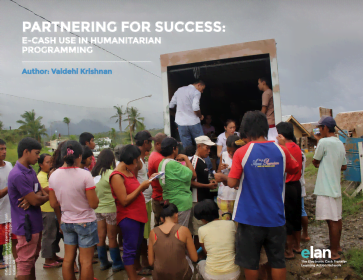
Partnering for Success: E-cash use in humanitarian programming
Policy paper
In recent years, new technologies have facilitated electronic cash transfers (e-transfers) to disaster- and conflict-affected populations. Utilizing e-cash in emergency response requires close partnerships with Financial Service Providers (FSPs), often in places where electronic payments are still...

Cash Transfer Programming for Syrian Refugees: Lessons Learned on Vulnerability, Targeting, and Protection from the Danish Refugee Council’s E-Voucher Intervention in Southern Turkey
Report
DRC Turkey is currently implementing a two-year, DFID-funded project that aims to provide immediate support to and strengthen the coping mechanisms of vulnerable non-camp Syrian refugees in southern Turkey. The first phase of the project focused on identifying and providing monthly cash transfers (in the...

Cash-based Interventions for Health programmes in Refugee Settings
Report
UNHCR aims to enable refugees to maximise their health status by supporting them to have equal access to quality primary, emergency and referral health services as nationals.The different settings of UNHCR’s operation, however, pose challenges due to the wide variety of , healthcare financing models and...

Household Cash Transfer Assessment – Typhoon Haiyan Recovery Response
Report
An estimated 16.1 million people were affected by typhoon Haiyan, with 1.1 million damaged or destroyed homes and as many as 4.1 million people displaced – nearly four times as many as those left homeless by the 2004 Indian Ocean tsunami. At least 6,300 people lost their lives and another 5.9...

Key Recommendations for Protection in Cash-based Interventions
Guidelines and Tools
This document outlines the key recommendations to ensure that protection is mainstreamed throughout the project cycle for cash-based interventions.

Liberia Ebola Response
Presentation
ICRCs EVD Cash response program had to be designed under a rare circumstance of insufficient baseline data on EVD impact on household level and limited opportunity to contact intended beneficiaries for a detailed assessment/ proper situational analysis.

Livelihoods Toolbox
Guidelines and Tools
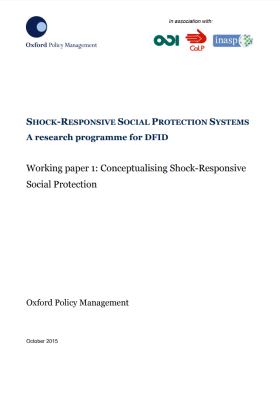
Working Paper 1: Conceptualising shock-responsive social protection
Report
The Shock-Responsive Social Protection Systems study is a two-year, £1 million research programme led by Oxford Policy Management (OPM), in consortium with the Overseas Development Institute (ODI), the the CALP Network and INASP, and funded by the UK Department for International Development (DFID). This...

The Impact of Cash Transfer Programmes on Protection Outcomes in Afghanistan
Report
Although cash-based interventions (CBIs) are increasingly used to deliver humanitarian assistance in support of more traditional in-kind emergency distributions, there is now a growing, global acceptance among stakeholders of the need to pay closer attention to the positive and negative impact of CBIs on...

A case for cash: crisis and disaster-affected populations’ perspective
Report
As the number, scale and duration of humanitarian crises increase, the provision of cash to affected people and communities presents a number of opportunities for more effective and efficient programming. The means by which such opportunities can be maximised is a source of ongoing debate involving a wide...
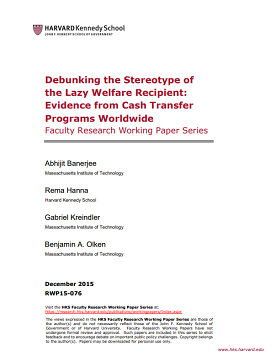
Debunking the Stereotype of the Lazy Welfare Recipient: Evidence from Cash Transfer Programs Worldwide
Report
Targeted transfer programs for poor citizens have become increasingly common in the developing world. Yet, a common concern among policy makers – both in developing as well as developed countries – is that such programs tend to discourage work. We re-analyze the data from 7 randomized controlled...

Enhancing Food Security and Nutrition during the First 1000 Days through Gender-sensitive Social and Behavioural Change: A Technical Resource Guide
Guidelines and Tools
This technical resource guide is designed to build the capacity of development practitioners working in nutrition and food security to plan, implement, and evaluate gender-sensitive SBC programming in order to improve nutritional outcomes for pregnant and lactating women (PLW) and children under two. It...
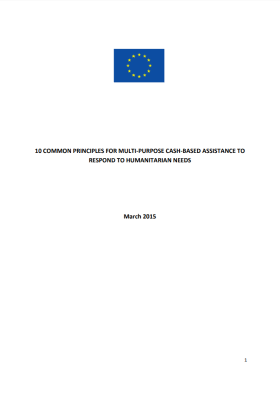
10 Common Principles for Multi-Purpose Cash-Based Assistance to Respond to Humanitarian Needs
Policy paper
These principles are intended to complement existing guidance on cash-based assistance and policy positions on those thematic areas which lend themselves to a multi-purpose approach. Donors and their partners are encouraged to take these principles into account in designing and implementing their...
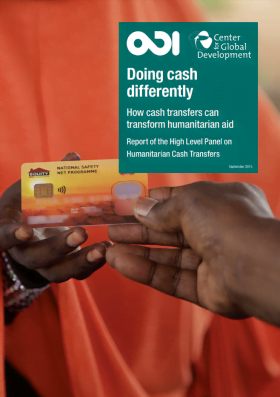
Doing Cash Differently: How cash transfers can transform humanitarian aid?
Policy paper
This report commissioned by the Overseas Development Institute highlights why giving aid directly in the form of cash is often a highly effective way to reduce suffering and to make limited humanitarian aid budgets go further. The publication, ,written by the High Level Panel on Humanitarian...

Markets in Crises: The 2010 Floods in Sindth, Pakistan
Case Study
Floods in Pakistan in 2010 inundated a wide swath of territory, affecting 18 million people and killing approximately 2,000. The disaster also affected businesses, from some of the largest factories and most fertile agricultural land in the country to small village shops. Many businesses closed, either...
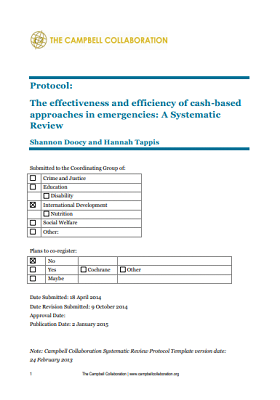
The Effectiveness and Efficiency of Cash-Based Approaches in Emergencies: A Systematic Review
Report
To access a document detailing the background, literature review, and objectives related to this review, please click here. Cash-based approaches have been used for development purposes for a number of decades, particularly within social protection interventions in low- and middle-income countries. Over...
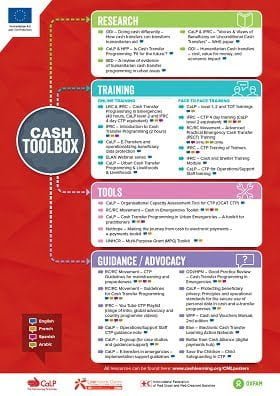
Cash Toolbox
Guidelines and Tools
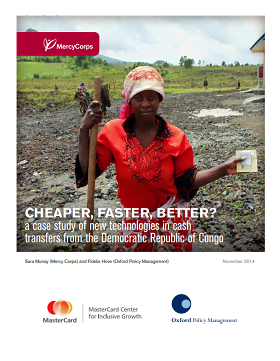
Cheaper, Faster, Better? A case study of new technologies in cash transfers from the Democratic Republic of Congo
Report
Over the past decade, there has been a growing consensus in the humanitarian community that cash, as compared to in-kind aid, is the best form of assistance to provide during an emergency. For families that have been displaced by a crisis or natural disaster, cash offers aid recipients more flexibility...
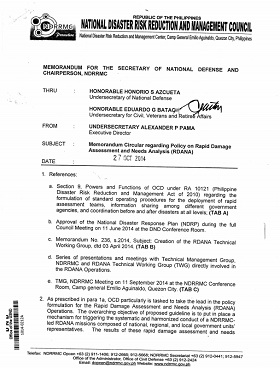
National Disaster Risk Reduction And Management Council
Report
